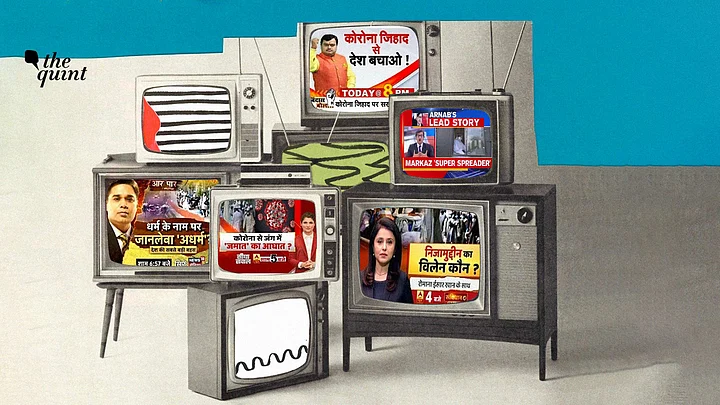The Central government recently told the Delhi High Court that it could not open the Nizamuddin Markaz for the public as the cases related to violation of COVID-19 protocols last year by the Tablighi Jamaat meeting and the ensuing investigation were “serious” and had “cross-border implications”.
Earlier this month, Chief Justice NV Ramana while hearing a case against media reports on the gathering said, “The problem is, everything in this country is shown with a communal angle by a section of the media.”
As esoteric, eccentric or deviant cults go, no religion is an exception. Those of us familiar with The Da Vinci Code, a popular historic novel on the esoteric Opus Dei cult, we know of the mysterious offshoots linked to Christianity, which also as recent as in 1993 had a death-embracing cult in David Koresh and his 'Branch Davidians' in Texas, US. About the worldwide sexual abuse in the Roman Catholic Church, there is no secret at all.
Blind Faith is Everywhere
During the Emergency, Prime Minister Indira Gandhi banned the Ananda Marga, an ostensibly Hindu sect, whose use of skulls in rituals raised more than eyebrows. The Naga sadhus at the Kumbh Mela with their ash-smeared nakedness have made many a Western photographer's career. Sikhism saw its own controversial variant in the Dera Sacha Sauda, whose leader Gurmeet Ram Rahim Singh is serving a prison sentence after being convicted of rape in his institution.
Islam is no exception to this rule. Al Qaeda claims to speak for the religion while being the latest of several groups linked to the religion practising violence on others.
But the question to ask in India is: Why should the Tablighi Jamaat, which held a global conference in New Delhi’s Nizamuddin area in March 2020, be suddenly demonised to a point where its practitioners have to go out of their way to clear themselves of patently unfair charges? Blame it on politics, media, and most importantly, a social fabric in which the worst is believed on the offshoot of a particular religion because everybody is mentally primed by an octopus-like propaganda machine to target a stereotype: the bearded, devout Muslim.
It is just the Tablighi Jamaat’s bad luck that it held its conference when a bewildered world was coming to grips with a recently found viral disease that marked the planet’s worst pandemic in a century. When several of its members tested positive for the COVID-19 virus, it was as if a million know-alls sported “I-told-you” T-shirts to go for the sect's jugular.
Kumbh Mela And Selective Hate
It is by now clear that the Islamic cult was no exception to a general rule in which COVID-appropriate behaviour was widely flouted. The Kumbh Mela happened earlier this year even as the second wave of the COVID-19 pandemic was spreading its ugly tentacles and even the prime minister was forced to mumble something about holding the Hindu festival in a symbolic way, rather than crack his famous whip usually reserved for opposition parties.
France and the US have had vaccination deniers taking the place of conspiracy theorists. They deserve an Oscar for ‘Covidiots’ if there was one. Despite having stocks of vaccines, the two countries have had to deal with the conservatism of a kind you would not expect in a post-Enlightenment scientific superpower.
The Tablighi Jamaat, however, is zeroed in on by media groups dramatically, dressing up their sycophancy to the powers-that-be with a zeal that can only be described as a missionary, although substantial dollops of advertising money they receive suggest they are better described as mercenary.
Tablighi Jamaat As a Soft Target
It thus fell upon the increasingly burdened shoulders of the judiciary to inform the polluted air of a pandemic-scared India that the Tablighi Jamaat’s leaders were not guilty, while the regulatory body of news broadcasters censured media entities, including Times Now, for their slander campaigns against the Tablighi Jamaat and Muslims.
Sadly, accusations happen with a bang but acquittals happen with a whimper.
The Tablighi Jamaat has no PR machinery to loudly proclaim its innocence. As Islamic sects go, the Jamaat is one whose followers believe in living life as their Prophet did, in austere ways. From all indications, this is a highly personal thing. Hardly the stuff you would associate with gun-toting Islamist groups, the biggest of whom have just run over Afghanistan and nearly being welcomed by the so-called international community with impunity that reeks of helplessness. It is as if bravery is reserved only for soft targets like the Tablighi Jamaat.
The Chief Justice of India, N.V. Ramana said this week that religions have to rise beyond superstitions and rigidities. He could have added a thing or two about media entities and the society at large being equally superstitious about religions. Ignoring facts, suspending disbelief and not even bothering to ask how true something might be, they have a tendency to believe the worst about some, although there is sufficient context to suggest that neither excellence nor mediocrity is unique to any religion or nation.
But it seems there is nothing like a heady cocktail of cultural pride and religious prejudice to make one believe what one is unconsciously or subconsciously trained to believe. Prejudice may be a religion in itself.
(The writer is a senior journalist who has covered economics and politics for Reuters, The Economic Times, Business Standard and Hindustan Times. He tweets as @madversity. This is an opinion piece and the views expressed above are the author’s own. The Quint neither endorses nor is responsible for the same.)
(At The Quint, we question everything. Play an active role in shaping our journalism by becoming a member today.)
